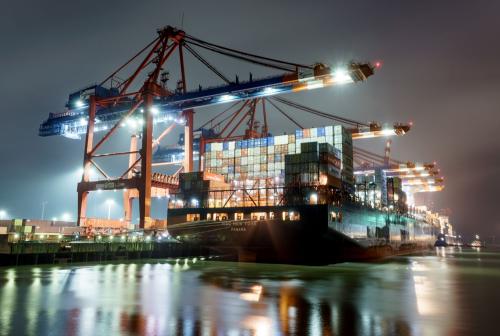On September 27, Foreign Policy at Brookings hosted President Sauli Niinistö of Finland for an Alan and Jane Batkin International Leaders Forum. President Niinistö has served as president since 2012 and recently won re-election in January 2018. He has a longstanding career in public service, including as speaker of parliament, minister of justice, deputy prime minister, and minister of finance.
In a keynote address, titled “A Stronger Europe: Our Common Interest,” President Niinistö spoke to the challenges facing Europe today and the critical role of the Euro-Atlantic partners in meeting these rising challenges. Following the president’s remarks, Strobe Talbott, former president and current distinguished scholar at Brookings, joined President Niinistö on stage for a conversation on these themes. Questions from the audience followed the discussion.
In a keynote address, President Niinistö talked about the importance of trans-Atlantic interests as the foundation for a strong and united Europe. He lamented the “uncertainty and insecurity” produced by increased tensions in international relations: “The credibility of the institution is being tested and completely new challenges pile up on top of the existing ones.” President Niinistö described the history of the European Union and praised the collective spirit of its founding members. He said the original role of the EU—to serve the citizens of its member states—remains unchanged. This mission has generated valuable policies and partnerships, in his view, that have strengthened Europe and its commitment to democracy, freedom, and the rule of law.
But President Niinistö warned that this mission is now at risk. When Finland became a member in 1995, attitudes toward European partnership were optimistic. But they have soured in the wake of Brexit and nationalist movements. The president expressed his belief that strengthening transnational relations on the continent requires resurrecting the “European spirit” that founded and sustained the EU.
The president argued that a strong EU and U.S.-EU partnership is critical in the face of mounting Chinese and Russian power. Beijing and Moscow are paying special attention to the governments of individual EU member states, at the same time that Washington has grown distant. If the United States continues on this path, Europe will become more susceptible to Chinese and Russian influence, he said.
Following the president’s remarks, Strobe Talbott asked him to “diagnose” the cause of Europeans’ ailing spirit. President Niinistö blamed an incorrect understanding of patriotism that has taken hold across the continent. Too many now view patriotism as a zero-sum game: They must love their country and protect its interests—and only theirs. He also blamed populist movements that spurn “elites” and degrade civil debate.
In order to serve as a global power in its own right, Europe must overcome these problems. Otherwise, the United States, China, and Russia will be the only three actors at the center of global conflict resolution. President Niinistö argued that strengthening Europe would be simple if its citizens could be persuaded to recommit to the essential values of the European Union. A more capable defense infrastructure and keener focus on security might make EU membership more appealing to many citizens. In line with this goal, President Niinistö favors strengthening solidarity with NATO and invoking “strategic autonomy,” which refers to expanded European jurisdiction over its own defense. He said: “If you are seen as strong, you get your voice heard.”
Talbott turned the conversation to Russian President Vladimir Putin, a man who “puts a lot of weight into his reputation for being strong,” asking President Niinistö to share his experiences working closely with Putin. President Niinistö remarked upon Putin’s enduring relationships with Finnish contacts from decades past, noting that “he doesn’t forget his friends” but that he also “doesn’t forget if he has not been dealt [with] respectfully.” According to President Niinistö, Putin’s pride is intertwined with that of Russian national pride; if he feels he has been disrespected, then he views it as disrespect toward Russia, too.
Audience questions focused on another issue that President Niinistö is passionate about: climate change and the state of the Arctic. When asked about his position as chair of the Arctic council, President Niinistö discussed the importance of maritime security, pressuring Southern Hemisphere countries to safeguard the Antarctic, and addressing the strategic implications of melting polar ice. In response to a question about European education, he emphasized the importance of education in combatting climate change and praised Finland’s school system for its high compensation of teachers.
President Niinistö and his wife recently had a child. The president poignantly expressed his view of global affairs in reference to his new son. “When I look at his blue eyes, I ask myself what kind of a world those eyes will be looking at in the future. That, dear friends, puts you thinking.”



Commentary
Finnish president: It’s in our common interest to have a stronger Europe
October 3, 2018